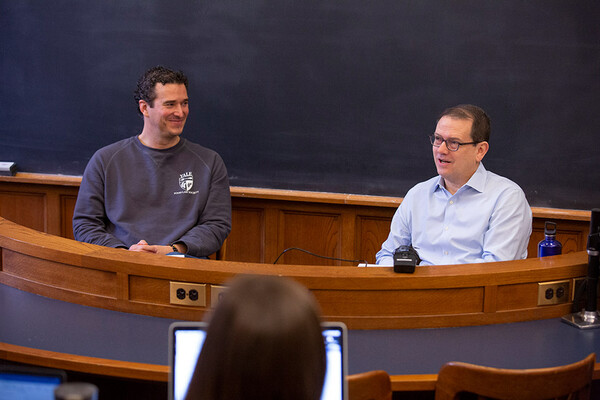Law, Ethics & Animals Program to Launch

A new initiative, the Law, Ethics & Animals Program (LEAP) at Yale Law School will launch during the 2019–2020 academic year as an interdisciplinary “think and do tank.” The program is dedicated to developing new strategies to address industrialized animal cruelty and its impacts, and to drawing attention to the questions of conscience raised by humanity’s treatment of animals.
The program will be led by two faculty directors, Joseph M. Field ’55 Professor of Law Doug Kysar and Senior Research Scholar & Lecturer on Law Jonathan Lovvorn, along with an executive director, Viveca Morris, who recently graduated with dual masters degrees from the School of Management and the School of Forestry and Environmental Studies.

It is a critical time in history for animals, according to Kysar. Each day brings news about issues like global wildlife disappearing in what has been called the planet’s sixth great extinction, new discoveries about animal intelligence that overturn past beliefs about human exceptionalism, and the harmful consequences of industrial animal farming. But, Kysar argues, the legal system has failed to keep up.
“Our laws regarding animals are often outdated, insufficient, or nonexistent,” said Kysar. “The past two centuries, and particularly the last two decades, have witnessed a massive transformation in human attitudes towards animals, underscored by fundamental shifts in scientific understanding of animals and ethical thought regarding our obligations to nonhuman creatures. At the same time, our power over animals has been amplified exponentially by industry and technology.”
“Animal law is a fast-growing field that demands exceptionally creative and smart lawyering,” Dean and Sol & Lillian Goldman Professor of Law Heather Gerken said. “I’m proud that our new Law, Ethics & Animals Program will establish Yale Law School as a leader in elevating, shaping, and defining this important field. LEAP will empower our students with opportunities to do innovative and impactful work to protect animals, people, and the environment.”
Programming planned by LEAP in its first year will include an Animal Law course cotaught by Kysar and Lovvorn in the fall. In the spring, LEAP will launch a new Climate, Animals, Food and the Environment Law & Policy Lab. The CAFE Lab, perhaps the first of its kind, will develop innovative legal and policy strategies to address the externalized costs of industrial animal agriculture – a top contributor to climate change, animal suffering, human exploitation, and environmental degradation.
“The damage wrought by industrial agriculture is staggering and rapidly expanding, and beyond the capacity of any one legal discipline to mitigate or reform,” said Lovvorn, who also serves as Chief Counsel for litigation at the Humane Society of the United States. “By engaging leaders from a broad array of disciplines, the CAFE Lab presents a unique opportunity to develop new strategies to understand, respect, and protect those who have been left behind by the current legal system.”
“Jon Lovvorn is widely recognized as one of the most brilliant, experienced, and accomplished litigators for animal protection in the nation,” Kysar said. “Jon is also an unusually gifted and engaging teacher, with a deep commitment to mentoring young lawyers. Having Jon at YLS will enrich us all enormously.”
LEAP will engage in additional research and policy work, and host a student fellows program, a public keynote lecture, and a speaker series. LEAP will also support and distribute the “When We Talk About Animals” podcast, hosted by Morris and Lindsay Stern, Ph.D. ’23, and launched in late 2018.
“Every day, I am more thoroughly convinced that laws that deal with humanity’s relationship to non-human animals will prove to be among the most critical issues of our time,” Manny Rutinel YLS ’21, co-chair of the Yale Animal Law Society, said. “LEAP will give the Yale community a unique opportunity to make an impact on issues that affect our environment, the health of our population, and the billions of animals used in industrialized agriculture. This is an opportunity that my classmates and I are genuinely ecstatic about.”
LEAP’s approach to animal law is expansive and creative. “When we say ‘animal law’ at YLS, we include environmental law, labor law, immigration law, health law, consumer protection law, anti-trust law, media freedom laws, etc., as each can be harnessed in new ways to help animals, people, and the environment,” Morris said.
LEAP foresees collaborations with peer schools’ animal law and animal studies programs, as well as with other academic units at Yale, such as the School of Forestry & Environmental Studies, the School of Management, and the School of Public Health. In its approach, LEAP aims to convene leaders from a broad array of disciplines to contemplate and develop new, inclusive legal standards, policies, and strategies that reflect our evolving moral values and modern scientific understanding.
“Human-animal relationships raise profoundly important questions of power, conscience, and the consequences of human actions for all living beings,” Morris said. “The topic of animals and the law quickly reaches some of the deepest questions of what it means to be a good human.”
The Law, Ethics & Animals Program at Yale Law School is supported by generous gifts from an anonymous donor; The Quinn Foundation, Chuck and Jennifer Laue, Directors; the Brooks McCormick Jr. Trust for Animals Rights Law and Policy; the Brooks Institute for Animal Rights Law and Policy, Inc.; and the Animal Welfare Trust.


